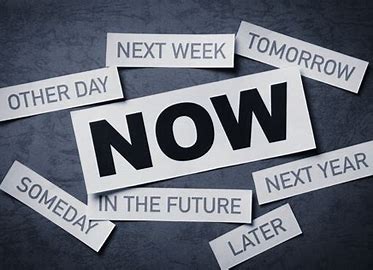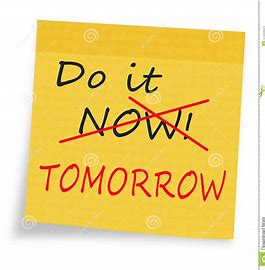We all procrastinate. We do less urgent tasks in preference
to the more urgent ones, or pleasurable jobs in place of less pleasurable ones.
But for some of us, procrastination can stop us performing well at work, or
might even make us delay seeking medical treatment.

There are many reasons people put off doing tasks. Some are
just too overwhelming, complex or boring (such as your tax return), while we
avoid others because we’re distracted or fatigues, or we fear we won’t do them
well.
Procrastination isn’t a character flaw, laziness or poor
time management, argue some psychologists, but rather it’s a way of coping with
challenging emotions and negative moods induced by certain tasks. By putting
off the task, we get rid of the bad feeling, whether it’s anxiety, fear,
boredom, frustration, or self-doubt.
“Procrastination is an emotion regulation problem, not a
time management problem,” said Dr Tim Pychyl, professor of psychology and
member of the Procrastination Research Group at Carleton University in Ottawa,
Canada.

Unfortunately putting off the task only makes the negative
associations we have with it worse, which contributes to further
procrastination. It can also generate worry, guilt and stress which along with
affecting your productivity, may also impact your mental health.
So what can you do if you think you might be a habitual
procrastinator?
Forgive yourself.
Research suggests this one of the most effective things that
you can do. In a study by Dr Pychyl and his colleagues, students who reported
forgiving themselves for procrastinating on studying for a first exam ended by
procrastinating less for a second exam. This works because procrastination is
linked to negative feelings, the researchers say. Forgiving yourself can reduce
the guilt you feel about procrastinating, which is one of the main triggers for
procrastinating in the first place.
Don’t wait until you are in the right mood.
One of the most important things, advises Dr Pychyl, is to
recognise that you don’t have to be in the mood to do a certain task.
“Most of us seem to tacitly believe that our emotional state
has to match the task at hand,” says Dr Pychyl. But that’s just not true.
Recognise that you’re rarely going to feel like it, he advises, and that it doesn’t
matter if you don’t feel like it.
Start with one small step.
Even if it’s a tiny action such as working for 10 to 15
minutes on a task, a little progress will make you feel better about the job
ahead and increase your self-esteem, which in turn reduces your need to
procrastinate to make yourself feel better.
“We can’t deny our feelings, but we can pay less attention
to them… and our research has shown that getting started is key,” says Dr
Pychyl.